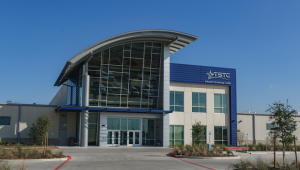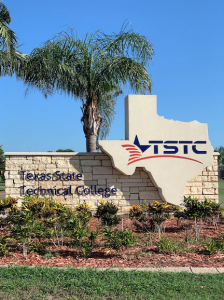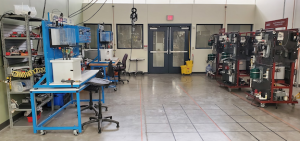(ROSENBERG, Texas) – The encouragement of a friend and a charismatic instructor helped Shyann Kocurek make the decision to enroll at Texas State Technical College.
The El Campo native recently earned her Associate of Applied Science degree in Environmental Technology – Compliance while experiencing one of the greatest hardships in life. Now she is eager to get to work, and she is grateful for the help she received at TSTC.
“My best friend had just started working at TSTC and encouraged me to talk with an instructor named Ms. (Maria) Vaughan,” she said. “I ended up loving what she had to say about the Environmental Technology – Compliance program, and I enrolled the following semester.”
Vaughan spoke fondly of Kocurek.
“Shyann has shown a great amount of initiative from the very beginning of the program,” she said. “She is always striving to improve and get ahead of the game. She is strong, dedicated and motivated.”
Students in the Environmental Technology – Compliance program learn about how environmental and safety standards are combined. Vaughan said that the creativity involved in the curriculum made for class time that was never boring.
“Students learn about the environmental regulations, what they mean, how to implement rules, and in essence how to be compliant with federal and state regulations,” she said. “Sometimes it is like ‘Bill Nye the Science Guy’ in my lab.”
Kocurek was determined to complete the program, even as she suffered a devastating loss.
“My mom passed away in June,” she said. “I had a hard time trying to keep going to finish with my goal I had set for myself.”
But Kocurek persevered. She received TSTC’s Texan Success Scholarship, which she says helped alleviate much of the worry she felt about paying for the program she grew to love.
“That scholarship helped me,” she said. “At the time, I did not have the money to pay for the first payment on the payment plan that I was on, but that scholarship took care of almost all of my tuition. It saved me.”
Vaughan recalled the resilience shown by Kocurek.
“She is an amazingly strong young woman,” she said. “Seeing her pain and loss, and seeing her good work ethic come through during that time, she reminded me how important it is to remember our ‘why.’ It was easy to see that her ‘why’ is her love for her family.”
Kocurek has some advice for those who follow in her footsteps at TSTC.
“Set goals for yourself, and do not let anything deter you from those goals,” she said. “Always ask questions, no matter the situation. There is always someone at TSTC who is willing to help. Without asking questions, you do not learn, and if you do not learn, you do not grow.”
To learn more about TSTC, visit tstc.edu.






